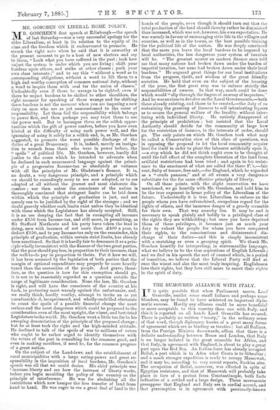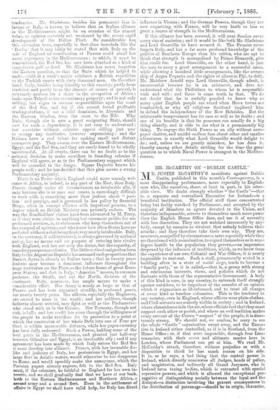THE RUMOURED ALLIANCE WITH ITALY.
IT is quite possible that when Parliament meets, Lord! Granville, amidst some small failures and perhaps some blunders, may be found to have achieved an important diplomatic success. Hardly any alliance could be more beneficial or more acceptable to this country than one with Italy, and this it is reported on all hands Lord Granville has secured. There is probably no written " treaty," in the ordinary senseof that word, though diplomacy knows of a great many forms of agreement which are as binding as treaties ; but all Italians, from the Foreign Minister downwards, affirm that there is a definite understanding between Rome and London, that Italy is no longer isolated in the great scramble for Africa, and that Italy, in agreement with England, is about to play a great part upon the Red Sea. An Italian force has already occupied Beilul, a port which is to Aden what Ceuta is to Gibraltar ; and a much stronger expedition is ready to occupy Massowah, and it may be, according to very recent reports, Suakim also. The occupation of Beilul, moreover, was effected in spite of Egyptian resistance, and that of Massowah will probably take place in face of a protest from Constantinople, both facts indicative of a settled and a large design. These movements presuppose that England and Italy are in cordial accord, and that presumption is in agreement with previously-known
tendencies. Mr. Gladstone, besides his permanent bias in favour of Italy, is known to believe that an Italian alliance in the Mediterranean might be on occasion of the utmost value, au opinion certainly not weakened by the recent rapid ,development of the Italian Fleet. So considerable has this extension been, especially in first-class ironclads like the Duilio,' that it may fairly be stated that with Italy on the side of England no combination of Powers could assail her naval supremacy in the Mediterranean ; to which, it must be remembered, the Red Sea has now been attached as a kind of long-drawn gulf or fiord. Mr. Gladstone has never forgotten the Eastern question, or that the State which he helped to make, could at a week's notice reinforce a British expedition to the Turkish coasts with sixty thousand men. On the other hand, Italy, besides being friendly to this country, partly from tradition and partly from the absence of causes of quarrel, is extremely anxious for a share in the occupation of Africa ; looks upon Tripoli as her reversionary property ; and is not only willing, but eager to assume responsibilities upon the coast of the Red Sea. and try if she cannot found profitable trading-stations, if not a solid dominion, in Abyssinia and the Eastern Soudan, from the coast to the Nile. Why Italy, though she is now a great emigrating State, should care for such a dependency, it is not easy to understand ; but countries without colonies appear willing just now to occupy any territories, however unpromising : and the Italians have a real talent for making small and distant commerce pay. They swarm over the Eastern Mediterranean, Egypt, and the Red Sea, and they are rarely found to be wholly unsuccessful. At all events, there can be no doubt as to the national decision to make sacrifices in founding colonies if England will agree, or as to the Parliamentary support which will be accorded to the design. Signor Depretis knows his people well ; and he has decided that this plan means a strong Parliamentary majority.
There is no Power which England would more warmly welcome in Africa, or indeed, in any part of the East, than Italy. France, though under all circumstances an invaluable ally, if only because she is so near our coasts, is exceedingly difficult to work with, is something more than jealous about " position and prestige, and is governed in her policy by financial Rings, often in corrupt alliance with important persons, to a degree which no British Ministry can patiently endure. The way the Bondholders' claims have been advocated by M. Ferry, as if they were claims to anything but enormous profits for unperformed services, is, to statesmen who keep themselves out of the cesspool of agiotage, and who know how often States have repudiated without a shot being fired, very nearly intolerable. Italy, on the contrary, if self-interested, is always governed by national policy, has no means and no purpose of entering into rivalry with England, and has not only the desire, but the capacity, of founding prosperous colonies. The little-noticed emigration from Italy to the Argentine Republic has assumed such proportions that Buenos Ayres is already an Italian town ; that in twenty years Italians may become a dominant influence throughout the huge territories on the Plate,—the future home of great European States ; and that in Italy, "America " means, in common parlance. the South, and not the North, division of the continent. Italy, moreover, has ample means to make a considerable effort. Her Army is nearly as large as that of France, and has been organised steadily, in profound peace, for nearly twenty years. Her officers, especially the Engineers, are second to none in the world ; and her soldiers, though hitherto almost untried, may fight as well as the Piedmontese who stood with us in the Crimea. Her Treasury, though not rich, is full ; and her credit has risen through the willingness of the people to make sacrifices for its protection to a point at which the conversion of her whole Debt into one of Four per Gent. is within measurable distance, while her paper-currency has been fully redeemed. Such a Power, holding some of the best ports in the Mediterranean, and planted just half-way between Gibraltar and Egypt, is an invaluable ally ; and if any agreement has been made by which Italy enters the Red Sea it must develop into alliance. France, with her incurable dislike and jealousy of Italy, her pretensions in Egypt, and her large fleet in Asiatic waters, would otherwise be too dangerous to Rome, and would speedily make the annoyance, which the Parisian papers already express, felt in the Red Sea. Italy must, if she colonises, be faithful to England for her own intereats, and we shall gradually find that we have at our back, both in the Eastern Mediterranean and Northern Africa, a second army and a second 'fleet. Even in the settlement of affairs in Egypt we shall have valid help, for Italy has direct
influence in Vienna ; and the German Powers, though they are now coquetting with France, will be very loath to lose so great a source of strength in the Mediterranean.
If this alliance has been secured, it will next Session cover many sins of omission ; and it would be like both Mr. Gladstone and Lord Granville to have secured it. The Premier never forgets Italy, and has a far more profound knowledge of the politics of Southern Europe than his critics, who are apt to think that strength is monopolised by Prince Bismarck, give him credit for. Lord Granville, on the other hand, is just the man to carry a great arrangement to a successful issue, while allowing a hundred little arrangements, like the owner-, ship of Angra, Pequeila and the rights of aliens in Fiji, to drift. Mr. Matthew Arnold says Lord Granville, though adroit, is unsuccessful because he is an aristocrat, and does not understand what the Philistines to whom he is responsible wish and will ; and there is some truth in that. We do not doubt that he is awfully puzzled to know why so many quiet English people are vexed when flora towns are bombarded, or why all religious Scotland implored' him to defend the independence of the New Hebrides. But the aristocratic temperament has its uses as well as its faults ; and one of its benefits is that its possessor can usually do a big thing silently, and is able to see what is a permanently big thing. To engage the Sixth Power as an ally without newspaper chatter, and amidst endless fuss about other and smaller adventures, is exactly what Lord Granville would delight to do ; and, unless we are greatly mistaken, he has done it. thereby among other details settling for the time the great question as to which Naval Power is strongest in the Mediterranean.



































 Previous page
Previous page